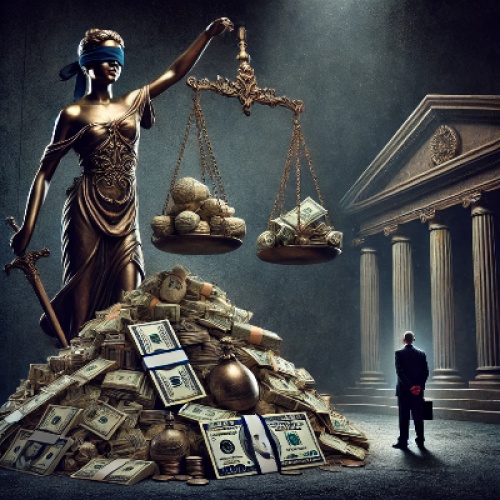The age-old phrase "justice is blind" is meant to symbolize fairness, impartiality, and equality before the law, irrespective of race, gender, social standing, or wealth. However, the dark realities of our global judicial systems reveal that this noble ideal is far from the truth. Justice is not blind in the equitable sense - it is blinded by power, privilege, and wealth. This reality forces us to confront an uncomfortable question: If justice is indeed blind, does it fail to recognize the true worth of a person, assigning value instead to their financial and social standing?
The Philosophy of Justice: The Ideal vs. Reality
From ancient times, philosophers like Plato and Aristotle have sought to define justice. Plato viewed justice as societal harmony, with every individual performing their role without encroaching upon others. Aristotle expanded on this, emphasizing fairness: treating equals equally and unequals unequally but proportionally.
Yet, in today's world, these philosophical ideals crumble under the weight of wealth-driven inequality. Justice, far from being an impartial guardian, is often swayed by those who can afford to manipulate it. The scales of justice are tipped by money, leaving the powerless to bear the brunt of systemic biases.
The Role of Money in the Justice System
In modern judicial systems, money often dictates the outcome of legal battles. Wealth buys access to elite lawyers, expert witnesses, and extended legal strategies that those without resources cannot afford. Public defenders, burdened with overwhelming caseloads, are rarely equipped to provide the same quality of defense.
Consider the disparity in bail systems: while the wealthy can pay their way to freedom, the poor languish in jail for months or even years, awaiting trial. This unequal access to justice perpetuates a cycle of oppression.
Case Studies: When Justice Fails the People
High-profile cases often expose the glaring flaws in the system. For instance:
The Case of Atul Subhash: Atul Subhash, a victim in a road rage incident, tragically lost his life, but the justice system failed his family. Despite overwhelming evidence against the perpetrators, procedural delays, lack of proper investigation, and financial influence derailed the case. His family continues to fight for justice in a system that seems indifferent to their pain.
Dr. Momita Banerjee's Case: Dr. Momita Banerjee was a promising young doctor whose life ended under mysterious circumstances. Her family alleges foul play, but the justice system has yet to hold anyone accountable. Corruption, delays, and apathy have turned her case into yet another example of how the system fails to serve the powerless.
College Admissions Scandal: This global scandal, involving the rich and famous bribing universities, highlighted how the privileged can bypass systems designed for meritocracy. While the wealthy faced minor consequences, the ripple effects on deserving students from underprivileged backgrounds were devastating.
These cases illustrate a recurring theme: when wealth and influence enter the courtroom, the pursuit of truth and fairness often takes a back seat.
The Human Cost: When Justice Ignores the Marginalized
The failure of justice is not just a systemic issue; it is a deeply human one. For the marginalized, the legal system often represents oppression rather than protection. Over-policing in low-income communities, coupled with inadequate legal representation, creates an environment where poverty equates to guilt.
Victims and their families are forced to relive their trauma, battling a system that seems more interested in preserving power than delivering fairness. This erodes trust in the judiciary and perpetuates cycles of poverty, inequality, and disenfranchisement.
Erosion of Public Trust in Justice
When justice appears to favor the wealthy, it undermines the very foundation of society. Public trust in legal systems erodes, leading to disillusionment and resentment. People begin to see laws not as a shield but as a sword wielded by the powerful.
This lack of trust has profound consequences. It discourages individuals from seeking justice, allows systemic corruption to thrive, and widens the gap between the rich and the poor.
The Moral Dilemma: Can Justice Be Reformed?
Reforming the justice system is no easy task. It requires systemic changes, such as:
Equal Access to Legal Representation: Public defenders should be adequately funded and supported to ensure fair trials for all.
Judicial Accountability: Courts must be transparent and held accountable for biases and delays.
Cap on Legal Costs: To prevent wealth from dictating outcomes, legal fees should be regulated.
Abolishing Wealth-Based Bail Systems: Replace monetary bail with equitable systems that evaluate risk rather than financial capacity.
Without these reforms, justice will remain a commodity - available only to those who can afford it.
Conclusion: Justice is Blind, But Not Impartial
Justice is indeed blind, but it is blind to the humanity of those without wealth. It is blind to the suffering of the marginalized and the plight of the innocent. Instead, it is all too aware of the weight of money and influence, bending to the will of those who possess them.
Cases like those of Atul Subhash and Dr. Momita Banerjee starkly illustrate this reality. The system assigns more value to financial power than to the moral worth of an individual, perpetuating inequality and injustice.
The brutal truth is this: justice, as it stands today, rewards wealth and punishes poverty. It is blind in the wrong ways, failing to see the people it is meant to protect. Until systemic changes are made, the scales of justice will remain heavily tilted, and the dream of true fairness will remain an elusive ideal.
Justice is truly blind - and that is why a person often holds no value in its current framework. The true value lies not in morality, character, or innocence but in the power of money. This harsh reality is a stain on the ideals of fairness and equality and a call to action for a more just future.




